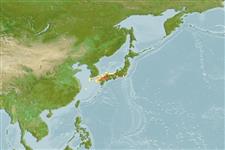>
Syngnathiformes (Pipefishes and seahorses) >
Syngnathidae (Pipefishes and seahorses) > Syngnathinae
Etymology: Hippocampus: Greek, ippos = horse + Greek,kampe = curvature (Ref. 45335); sindonis: Named for M. Sindo, an assistant curator of fishes at Stanford University (Ref. 117115).
Eponymy: Michitaro Sindo, originally from Yamaguchi, Japan, was one of Jordan’s students at Stanford University, and became Assistant Curator of fishes there. [...] (Ref. 128868), visit book page.
More on authors: Jordan & Snyder.
Environment: milieu / climate zone / depth range / distribution range
Ecología
marino demersal; no migratorio; rango de profundidad 0 - 75 m (Ref. 128812). Subtropical
Distribución
Países | Áreas FAO | Ecosistemas | Ocurrencias, apariciones | Point map | Introducciones | Faunafri
Northwest Pacific: southern Japan.
Length at first maturity / Tamaño / Peso / Age
Maturity: Lm 4.0 range ? - ? cm
Max length : 10.8 cm SL macho / no sexado; (Ref. 117115)
Short description
Claves de identificación | Morfología | Morfometría
This species is distinguished in having the following characters: bony body; double gill openings; R 10 + 35-38 (holotype: 10 + 37); coronet moderately high; CoT 5; CHGO 26.8-41.0 % HL; CHMC 36.3-55.4 % HL; a very blunt or truncated spine on the dorsal fin base; absence of the wing-tip spine on dorsal fin base (Ref. 117115).
Reported to live in a wide range of habitats, from shallow high-energy algae reefs to soft bottom habitats (Ref. 117115). Length type refers to height (= TL - head length). Ovoviviparous (Ref. 205). The male carries the eggs in a brood pouch which is found under the tail (Ref. 205).
Life cycle and mating behavior
Madurez | Reproducción | Puesta | Huevos | Fecundidad | Larva
Male carries the eggs in a brood pouch (Ref. 205).
Lourie, S.A., R.A. Pollom and S.J. Foster, 2016. A global revision of the seahorses Hippocampus Rafinesque 1810 (Actinopterygii: Syngnathiformes): taxonomy and biogeography with recommendations for further research. Zootaxa 4146(1):1-66. (Ref. 115213)
IUCN Red List Status (Ref. 130435: Version 2024-1)
Threat to humans
Harmless
Human uses
Herramientas
Special reports
Download XML
Fuentes de Internet
Estimates based on models
Preferred temperature (Ref.
123201): 14.2 - 21.6, mean 18.3 °C (based on 107 cells).
Phylogenetic diversity index (Ref.
82804): PD
50 = 0.5000 [Uniqueness, from 0.5 = low to 2.0 = high].
Bayesian length-weight: a=0.00447 (0.00175 - 0.01142), b=2.99 (2.77 - 3.21), in cm total length, based on LWR estimates for this (Sub)family-body shape (Ref.
93245).
Nivel trófico (Ref.
69278): 3.4 ±0.5 se; based on size and trophs of closest relatives
Resiliencia (Ref.
120179): Alto, población duplicada en un tiempo mínimo inferior a 15 meses (Preliminary K or Fecundity.).
Fishing Vulnerability (Ref.
59153): Low vulnerability (10 of 100).
